
Senate seats could flip in several states
Fox News congressional correspondent Aishah Hasnie previews some of the key races that could dictate the balance of power for the U.S. Senate in 2024 on ‘Special Report.’
Republicans are gearing up for what could be an epic showdown for majority control of the Senate with several contentious elections around the country later this year.
Democrats control the U.S. Senate with a 51-49 majority, but Republicans are looking at a favorable Senate map in 2024, with Democrats defending 23 of the 34 seats up for grabs. Three of those seats are in red states former Donald Trump carried in 2020 — West Virginia, Montana and Ohio.
Five other seats, one of which is held by an independent, are in key swing states narrowly carried by President Biden in 2020 — Arizona, Michigan, Nevada, Pennsylvania and Wisconsin.
Texas and Florida, where incumbents Ted Cruz and Rick Scott, respectively, are seeking re-election, appear to be the only potentially competitive GOP-held seats up for grabs next year.
‘TOUGHEST UPHILL CLIMB’: RACE FORECASTER REVEALS SHIFT TOWARD GOP IN TOP 2024 SENATE RACE

From left to right: Montana GOP Senate candidate Tim Sheehy; Sen. Jon Tester, D-Mont.; Sen. Tammy Baldwin, D-Wisc.; Sen. Sherrod Brown, D-Ohio; Arizona GOP Senate candidate Kari Lake; and Pennsylvania GOP Senate candidate Dave McCormick. (Getty Images)
Ohio
Longtime Democratic Sen. Sherrod Brown is the only member of his party to win a non-judicial, statewide election in Ohio in the past decade. As Brown runs in 2024 for a fourth six-year term representing Ohio, he is facing heavy targeting by Republicans in the state that was once a premier general election battleground but has shifted red over the past six years.
Trump carried Ohio by eight points in his 2016 presidential election victory and his 2020 re-election defeat. Last year, Trump’s handpicked Senate candidate in Ohio, Sen. JD Vance, topped longtime Democratic Rep. Tim Ryan by six points despite Ryan running what political experts considered a nearly flawless campaign.
Brown, who has served as a congressman, state lawmaker and Ohio secretary of state during his nearly half-century career in politics, has reportedly raked in $5.7 million in the first two months of 2024, giving his campaign $13.5 million on hand.
Two Republicans who ran unsuccessfully against Vance for the 2022 GOP Senate nomination in Ohio — state Sen. Matt Dolan and businessman Bernie Moreno — are in the race to oust Brown.
Dolan, a former top county prosecutor and Ohio assistant attorney general, launched his campaign in January 2023. Dolan, whose family owns Major League Baseball’s Cleveland Guardians, shelled out millions of his own money to run ads for his 2022 Senate bid.
He surged near the end of the primary race, finishing third in a crowded field of Republican contenders, winning nearly a quarter of the vote.
Moreno, a successful Cleveland-based businessman and luxury auto dealership magnate, declared his candidacy in April. An immigrant who arrived in the U.S. legally from Colombia with his family as a 5-year-old boy, Moreno also shelled out millions of his own money to run TV commercials to try and boost his first Senate bid. But he suspended his campaign in February 2022 after requesting and holding a private meeting with Trump.
In July, Ohio Secretary of State Frank LaRose joined the race, launching a much-anticipated Senate campaign. The state’s primary election is scheduled for March 19.
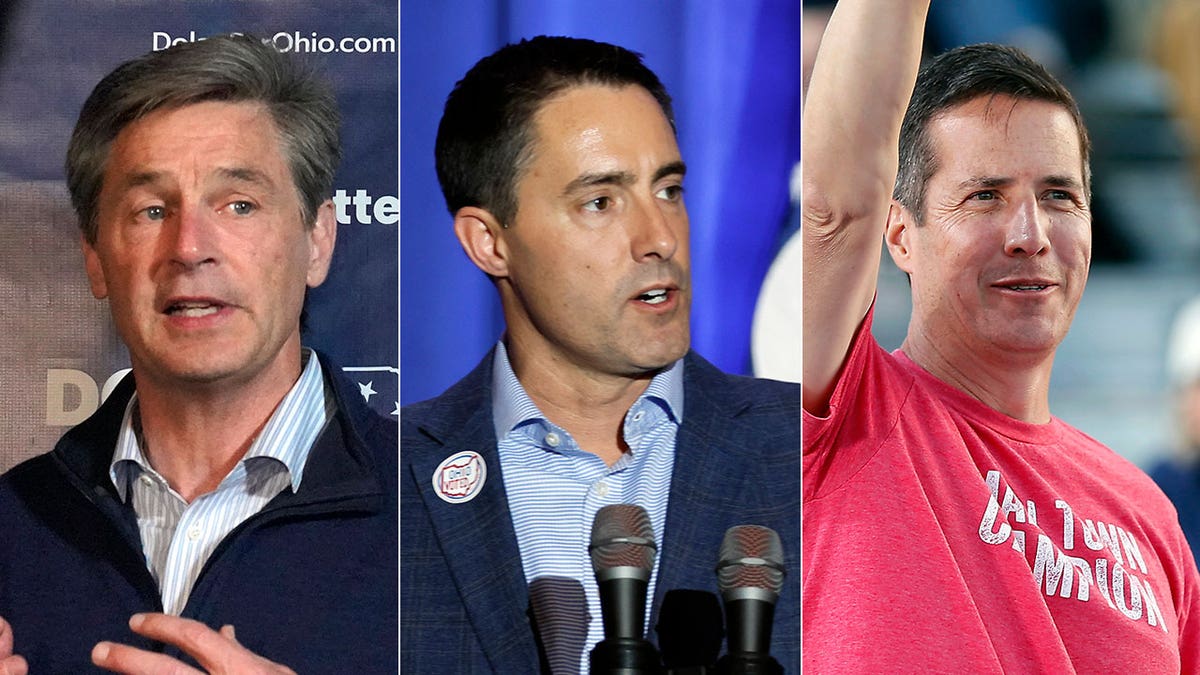
Ohio GOP Senate candidates Matt Dolan, Frank LaRose and Bernie Moreno are vying for their party’s nomination in the state’s March 19 primary. (AP)
Montana
Democrats breathed a sigh of relief when Sen. Jon Tester of Montana announced earlier this year that he would seek re-election in 2024 in a state Trump carried by 16 points in the 2020 presidential election. The Democratic incumbent, who’s running unopposed, had hauled in a formidable $15 million in fundraising as of the end of 2023.
Tim Sheehy, a former Navy SEAL and Purple Heart recipient who notched more than 200 missions in the wars in Iraq and Afghanistan and elsewhere around the globe, launched a Republican Senate bid in late June.
Sheehy, the CEO of Bridger Aerospace, a Montana-based aerial firefighting and wildfire surveillance services company, enjoys the National Republican Senatorial Committee’s (NRSC) backing and received an endorsement from Trump last month.
Sheehy will face off against four other GOP hopefuls, including former Montana Secretary of State Brad Johnson, in the state’s June 4 primary election.
Rep. Matt Rosendale, a hard-right congressman, had initially launched a bid for the Senate seat before withdrawing from the race.
Following his withdrawal, Rosendale, who narrowly lost to Tester in the 2018 Senate election, said he would seek re-election in Montana’s 2nd Congressional District. That plan, however, was halted last week when Rosendale announced he was suspending his House campaign, citing “current attacks” against him.
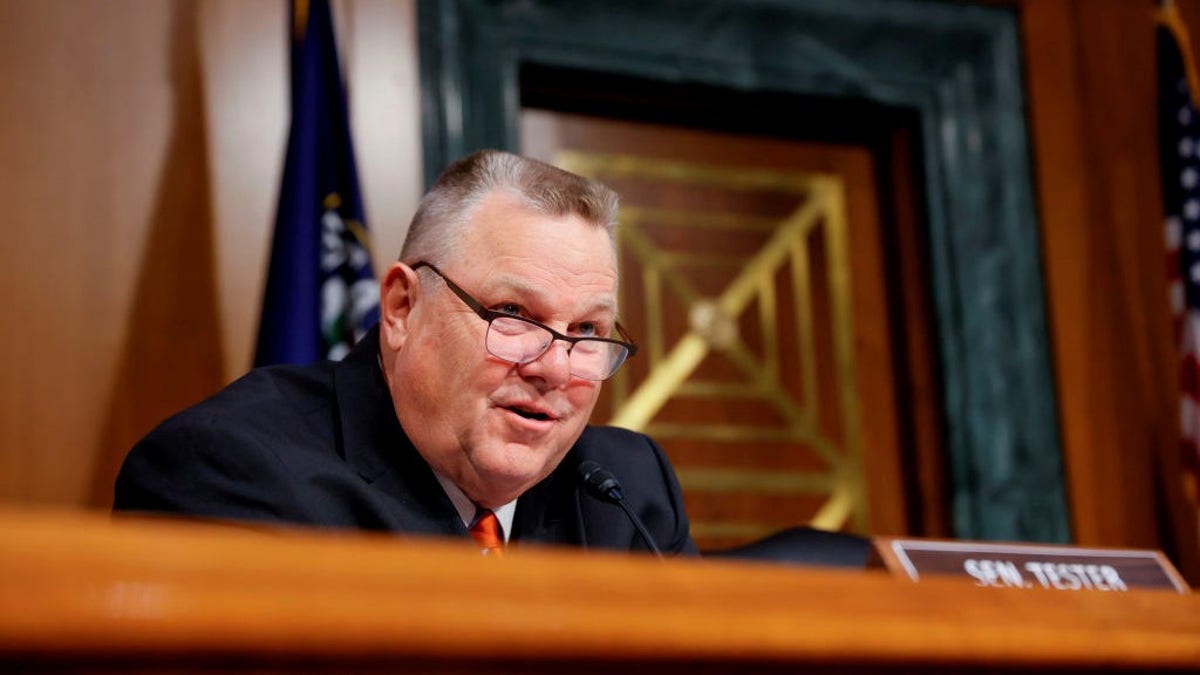
The campaign for Tester, who’s running unopposed, announced it had hauled in $15 million at the end of 2023. (Getty Images )
West Virginia
With Sen. Joe Manchin, D-W.Va., not seeking re-election, the race for the Senate in West Virginia is looking brighter for Republicans as they seek to flip the seat from blue to red.
Last year, NRSC Chairman Sen. Steve Daines said, “We like our odds in West Virginia.”
Right now, the main action is in the Republican Senate primary, where popular Democrat-turned-Republican Gov. Jim Justice has the backing of the NRSC and Trump. Among Justice’s six Republican challengers, the leading rival for the GOP Senate nomination is GOP Rep. Alex Mooney, who represents the state’s 2nd Congressional District and has received support from the fiscally conservative Club for Growth.
The first Democrat to jump into the race following Manchin’s departure was 32-year-old Zachary Shrewsbury, a native West Virginian and Marine Corps veteran. Two other Democrats — Don Blankenship and Glenn Elliott — are also running.
Manchin announced in November he would not be seeking re-election to his post in the upper chamber, saying in a video posted to X he believes he “accomplished what I set out to do for West Virginia” during his tenure in the Senate. Manchin, who previously served as governor of the state, was first elected to the Senate to represent West Virginia in a 2010 special election.
The state’s primary election is slated to take place May 14.
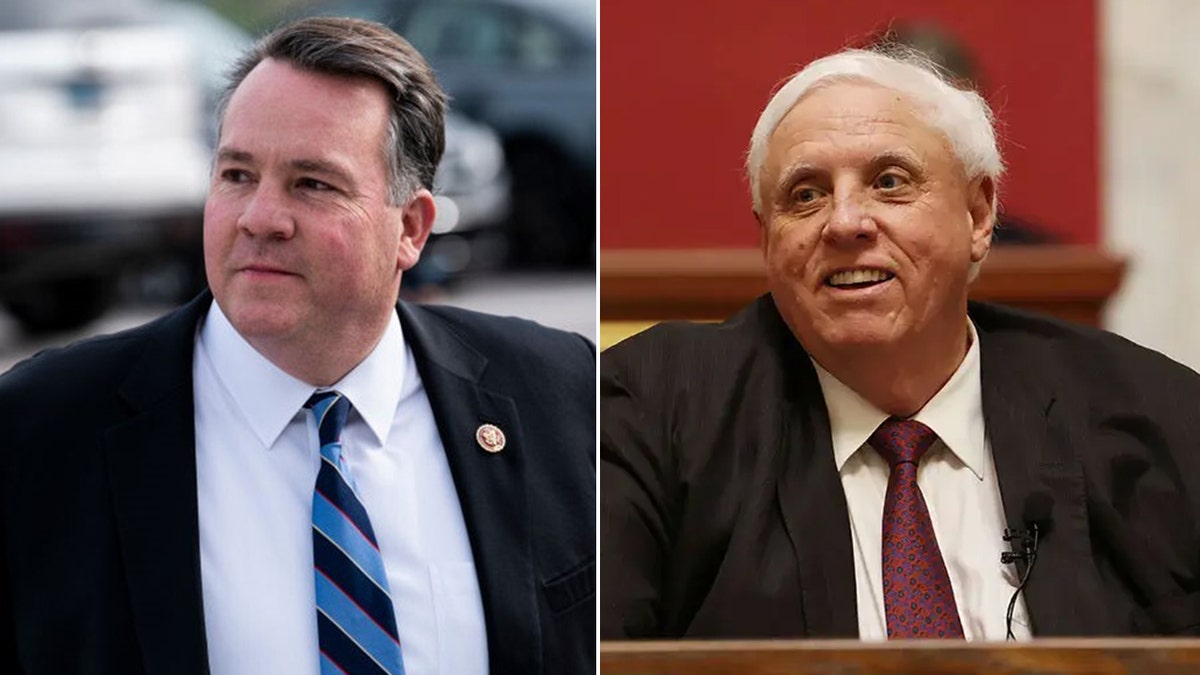
Rep. Alex Mooney, R-W.Va., left, and Republican West Virginia Gov. Jim Justice, right. (Getty/AP Photo/Chris Jackson)
Wisconsin
In Wisconsin, incumbent Sen. Tammy Baldwin, D-Wisc., is looking to retain her post in the upper chamber and clinch a third term in office.
Baldwin, who announced her candidacy in the race last April, has represented the Badger State in the Senate since 2013. She previously served in the Wisconsin State Assembly and represented the state’s 2nd Congressional District in the House from 1999 to 2013.
Running unopposed, Baldwin has received strong support from her party on a state and national level. However, Republicans are eager to make an attempt to win the seat this cycle.
GOP businessman and real estate mogul Eric Hovde launched his bid for the Senate in February and quickly became a target for Democrats as the party seeks to maintain control of the seat.
The Senate Majority PAC went up with a $2 million ad buy last week targeting Hovde as a “multi-millionaire California banker.” The ad attempted to portray Hovde as an “out-of-touch carpetbagger” whose interests don’t align with those of the Wisconsin constituency.
Recognizing the ad campaign, Mike Berg, the communications director for the NRSC, wrote on X: “How bad are @TammyBaldwin and @SenSchumer panicking about @EricHovde?”
Hovde previously ran in 2012 but lost in the GOP primary to former Gov. Tommy Thompson. Baldwin went on to win the general election that year.
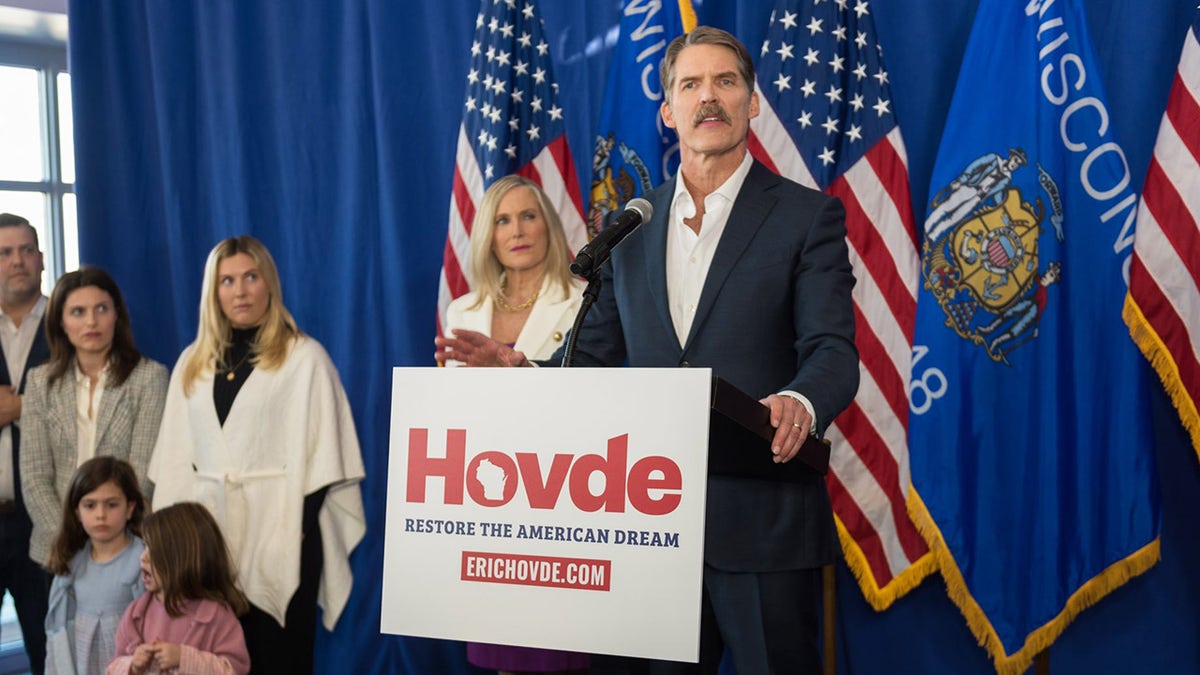
Hovde formally launched his bid for the U.S. Senate in February. (Eric Hovde campaign)
Arizona
With Democrat-turned-independent Sen. Kyrsten Sinema’s announcement that she won’t seek re-election, the spotlight for the Senate race in the battleground state of Arizona has shifted to two prominent candidates — Rep. Ruben Gallego, a Democrat who represents the state’s 3rd Congressional District, and Republican Kari Lake, who previously made a run for governor of the state in 2022.
It was reported earlier this year that Gallego, the top Democrat seeking the Senate seat, had raised $3.3 million in the fourth quarter of 2023. Since launching his bid for the seat in January 2023, Gallego’s campaign reported raising $13 million earlier this year.
Lake, a former TV news anchor who has been endorsed by several leading Senate Republicans and Trump, instantly became the GOP frontrunner when she jumped into the race last October.
Politico reported in January that Lake had “raised $2 million in the roughly 11 weeks after she entered the race, but she quickly spent nearly half that haul,” leaving her with a “little over $1 million in the bank — and $308,000 in debt” to start 2024.
Prior to Lake entering the race, Mark Lamb, a Republican who serves as sheriff for Pinal County, filed paperwork to run for the seat last April. Seven other Republicans are also seeking their party’s nomination for the seat in the state’s July 30 primary election.

From left to right: Republican Pinal County Sheriff Mark Lamb; Rep. Ruben Gallego, D-Ariz.; Sen. Kyrsten Sinema, I-Ariz.; and former Republican Arizona gubernatorial candidate Kari Lake. (Getty Images)
Pennsylvania
The Keystone State, a perennial general election battleground, will likely live up to its reputation once again in 2024 as it holds what will arguably be one of the most competitive and expensive Senate races in the country.
Sen. Bob Casey, a Democrat who served a decade as the state’s auditor general and then treasurer before first winning election to the Senate in 2006, is seeking a fourth six-year term in office.
Casey, who is not expected to face any serious Democratic primary challenge, is the son of a popular former governor.
Republicans appear united behind Dave McCormick, who is making his second straight Senate run. McCormick narrowly lost the state’s 2022 GOP Senate primary election to Dr. Mehmet Oz, who went on to lose in the general election to former Braddock Mayor John Fetterman.
McCormick, a former hedge fund executive, West Point graduate, Gulf War combat veteran and Treasury Department official in former President George W. Bush’s administration, was endorsed by the Pennsylvania GOP in late September, soon after he entered the race.
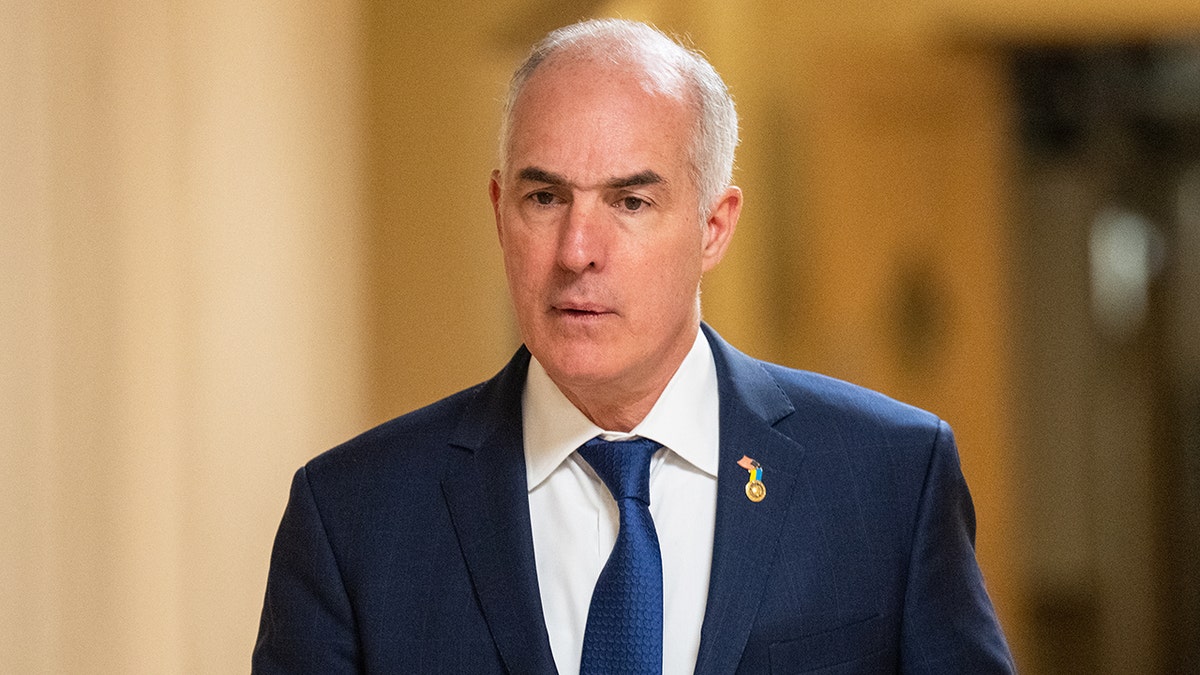
Casey, a Democrat who first won election to the Senate in 2006, is seeking a fourth six-year term in office. (Bill Clark/CQ-Roll Call, Inc via Getty Images)
CLICK HERE TO GET THE FOX NEWS APP
Axios reported in January that McCormick had raised $5.4 million in his first quarter as a candidate. Casey’s campaign announced at the beginning of the year that it had raised more than $3.6 million in the fourth quarter of 2023.
McCormick had been courted by national and state Republicans to run, and his candidacy gives the GOP a high-profile candidate with the ability to finance his own race.
The Associated Press contributed to this report.







